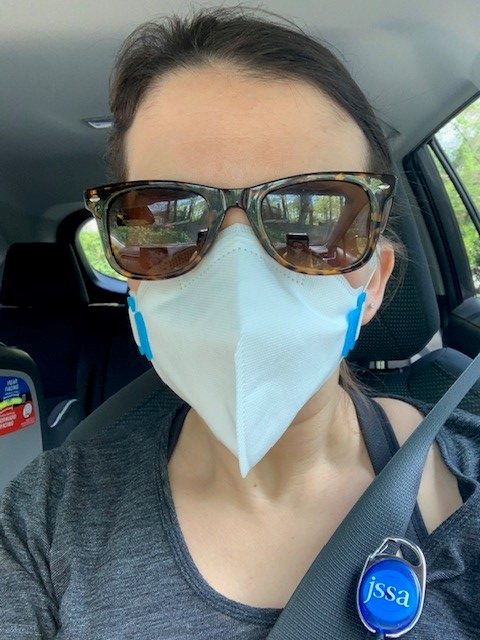Providing Hospice Care During the Pandemic

When we think of essential workers during COVID-19, we typically think of medical professionals, like doctors, nurses and paramedics, who treat a person’s physical illness, or professionals who care for the elderly in skilled nursing or assisted living facilities. But another aspect to caring for others during the pandemic is addressing the non-medical treatment of late-stage illnesses.
Today, we share with you what Emily Meister Odesser, a life-long Ramahnik (Ilanot ‘01-Niv ’07, Ramah Seminar ’08, Palmer Rosh Edah ’13-’15, Day Camp Rosh Edah ’19) and a licensed social worker, is doing to care for others during the pandemic.
Emily works for the Jewish Social Service Agency Hospice (JSSA Hospice), serving Montgomery County, Maryland. She works with adults of all ages and their families and caregivers.
Hospice care provides family-centered compassionate care for people who are experiencing an advanced, life-limiting illness so they may live as fully and comfortably as possible, either at home or in a facility. An interdisciplinary team of professionals, consisting of a nurse, social worker, and chaplain, work together to manage symptoms so that a person’s last days may be spent with dignity and quality, surrounded by their loved ones.
Emily, as the social worker on this team, strives to bring calmness and open-mindedness to difficult situations through empathy, advocacy and problem-solving. Emily will assess the issues facing the family, whether it is the need for more care in the home, help with advanced care planning or accessing other community resources. Emily is also there to provide bereavement/grief support for one year after someone passes away.
If hospice work is challenging under ordinary circumstances, it is much more so during the current pandemic. If the patient is living in a skilled nursing facility/assisted living, Emily must meet with the patient without the family present because family members are not allowed to visit. Emily shared that the families find great comfort knowing that she has visited their loved ones. When regulations have prevented Emily from entering a facility, she has resorted to telehealth phone support. At present, JSSA Hospice is also doing fewer team visits to limit the number of people in a room, and Emily now calls before going into a home to ensure that no one has any virus symptoms.
Like others who work closely with people who are ill with COVID-19, Emily is concerned about transmitting the virus to her loved ones. Fortunately, JSSA Hospice provides Emily with the necessary Personal Protective Equipment (PPE) – an N95 mask, plastic shield, gown and gloves – which greatly alleviates her worries.
Emily loves her job and finds it to be extremely fulfilling. This work has normalized her view of the end of life. She now truly understands that dying is a natural part of the life cycle and does not have to be scary. When people ask what she does for a living, there is usually an uncomfortable silence due to societal discomfort with the topic of dying. She acknowledges that she used to react in the same way.
Emily feels honored to spend this impactful time with her patients and their families, sharing in the experience of her patients’ final days with their loved ones.
Todah rabbah, Emily, for providing us with insight into your work as a hospice social worker, particularly during these remarkably unsettling times. Your patients and their families are very fortunate to have you to help them navigate and cope with the imminent passing of their loved ones.